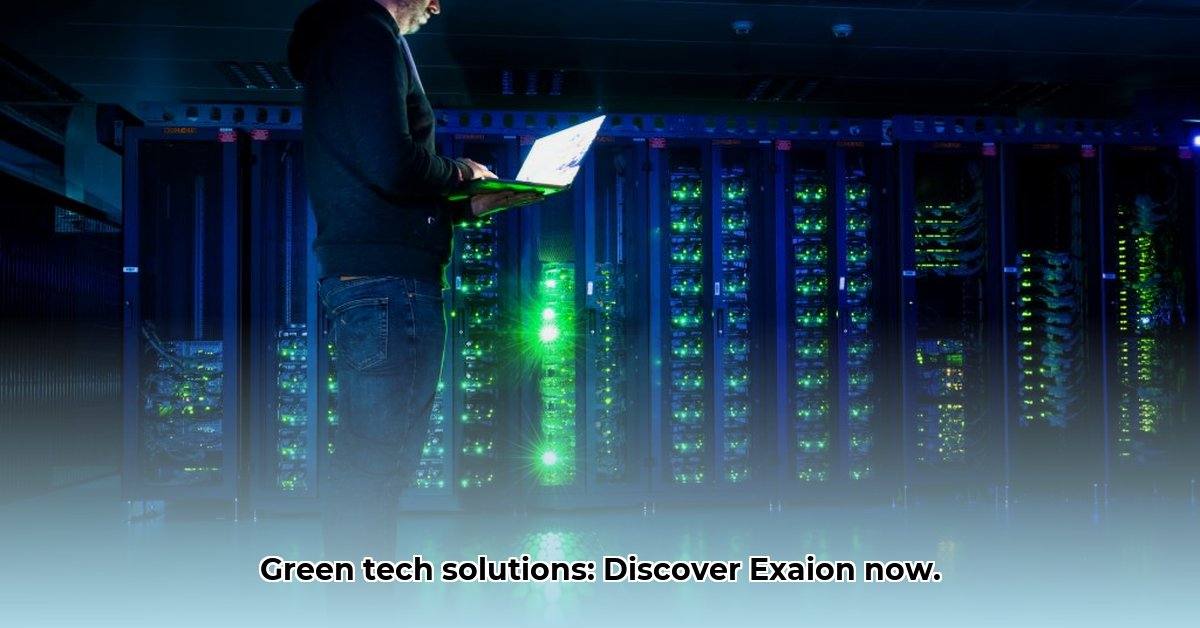
Exaion is pushing the boundaries of sustainable technology, promising eco-friendly solutions leveraging blockchain, high-performance computing (HPC), and even quantum computing. However, a critical evaluation is needed to determine whether Exaion's ambitious claims are substantiated by reality. This article analyzes Exaion's technology, scrutinizes its sustainability promises, compares it to competitors, and assesses its long-term viability.
Exaion's Technological Foundation
Exaion's approach integrates several advanced technologies. Blockchain, a secure digital ledger (think of it as a tamper-proof record-keeping system), offers transparency in supply chains, tracking environmental impact from raw materials to finished goods. High-performance computing (HPC) – essentially super-powerful computers – provides the computational muscle needed to analyze massive datasets, optimizing processes for reduced environmental impact. Finally, the company incorporates quantum computing, a nascent technology with immense potential for solving complex problems, although its current role in Exaion's offerings is yet to be fully elucidated.
However, a crucial question arises: How energy-efficient are Exaion's operations? The absence of publicly available data regarding energy consumption in their data centers raises concerns. Are they truly leveraging renewable sources to the extent claimed? Without this transparency, it is difficult to assess their environmental impact objectively.
Evaluating Exaion's Sustainability Claims
Exaion champions its commitment to sustainability, highlighting energy-efficient data centers powered by renewable energy. Yet, a critical assessment requires verifiable data. While their intentions may be laudable, claims need to be backed by measurable results and independently verified audits. What is their carbon footprint? What percentage of their operational energy comes from renewable sources? These questions remain unanswered, hindering a confident evaluation of their sustainability efforts.
Competitive Landscape Analysis
Exaion navigates a competitive marketplace teeming with sustainable technology providers. While its technological blend is unique, a detailed comparison with competitors is needed to determine its strengths and weaknesses. Established players and innovative startups offer similar solutions, creating a dynamic and challenging environment. How does Exaion's pricing strategy stack up? What is its market reach? Does it offer unique customer solutions that set it apart? This comprehensive analysis is absent from available information.
Risk Assessment and Future Prospects
A risk assessment reveals several challenges:
| Risk Factor | Likelihood | Impact | Potential Mitigation Strategies |
|---|---|---|---|
| Intense Competition | High | High | Focus on niche markets, unique selling propositions, strategic partnerships |
| Technological Advancements | Medium | High | Continuous R&D, adaptation to emerging technologies |
| Regulatory Uncertainty | Medium | Medium | Proactive regulatory monitoring, expert legal counsel |
| Data Security Threats | Low | High | Robust security protocols, regular audits, incident response planning |
| Energy Consumption (Blockchain) | Medium | Medium | Exploring energy-efficient blockchain consensus mechanisms |
Overcoming these challenges requires significant investment in research and development, strategic collaborations, and proactive regulatory compliance. However, the absence of detailed performance data and independent verification makes accurate prediction of Exaion’s long-term success difficult.
Conclusion: Promise and the Need for Proof
Exaion's vision of sustainable technological solutions is compelling. Its innovative technological stack holds promise. But a significant obstacle is the lack of concrete, independently verifiable data to support its sustainability claims. Exaion must transition from ambitious pronouncements to tangible evidence to build credibility and attract investors. Until then, its potential remains largely unproven. Only demonstrable results can solidify its position and ensure a successful trajectory.